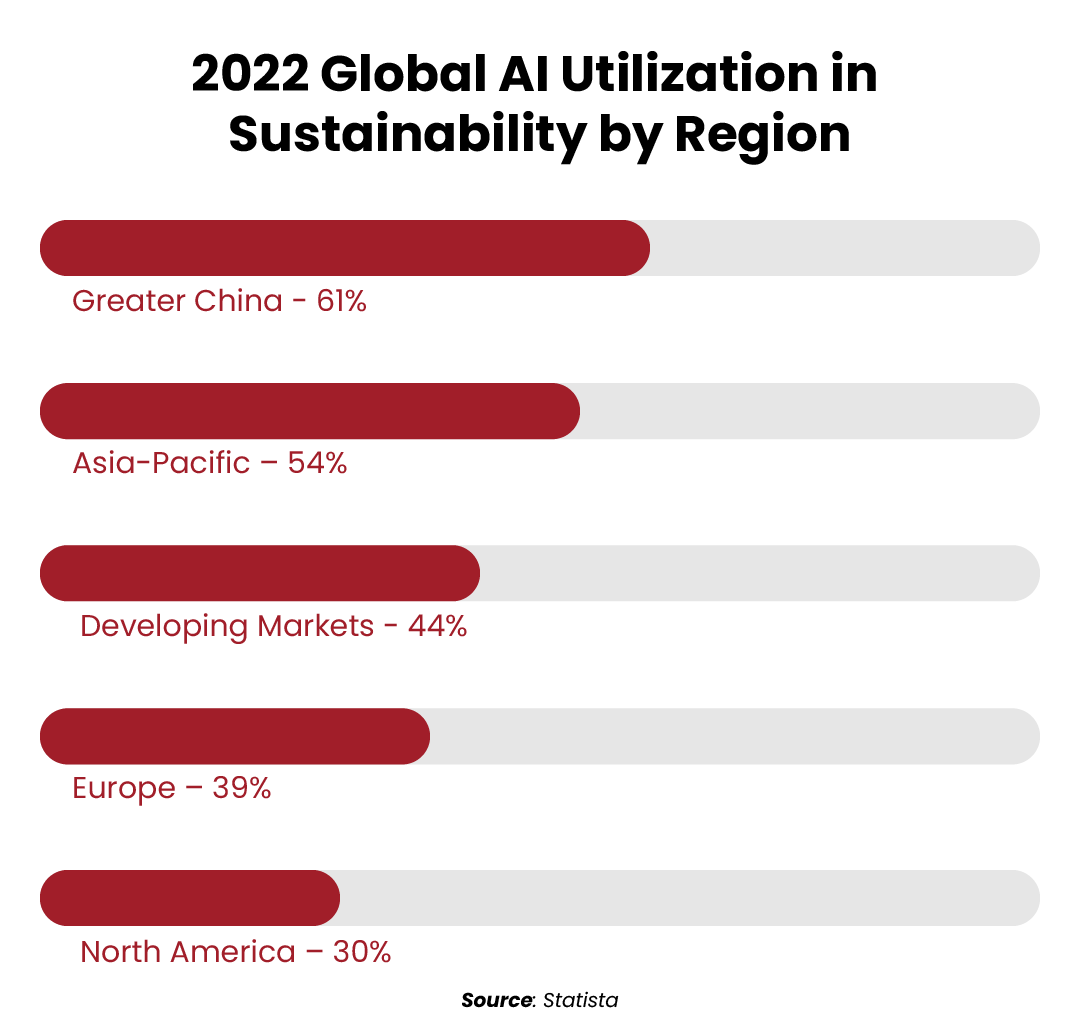We are living in a world where artificial intelligence (AI) is transforming eve....
Eco-Innovation: How AI is Shaping Sustainable Practices

In an era where sustainability is not just a choice but a necessity, the integration of Artificial Intelligence (AI) into our sustainability efforts represents hope and innovation. AI's unmatched ability to analyze huge datasets, predict trends, and optimize processes positions it as a pivotal tool in our journey for a sustainable future.
According to a report by Boston Consulting Group and Google, AI could play a significant role in reducing global greenhouse gas emissions, potentially mitigating them by 5-10%.
This article delves into the complex role of AI in sustainability, highlighting its transformative impact across various sectors and discussing the challenges and future potential of this synergy.
AI's Role in Enhancing Sustainability
AI's profound impact on sustainability arises from its three core capabilities: measuring, predicting, and optimizing complex systems.
These AI capabilities are pivotal in addressing environmental challenges that are otherwise too difficult for traditional analytical methods. One remarkable example lies in environmental monitoring, particularly in predicting and managing natural disasters like wildfires.
Wildfires, responsible for releasing about 7 gigatons of carbon dioxide annually, present a complex interplay of factors including weather, vegetation, and land use. AI's analytical prowess enables better prediction and management of these events, thereby, mitigating their environmental impact. Microsoft, among other tech giants, is leveraging AI in partnership with various organizations to reduce wildfire risks through advanced predictive models.
According to Statista, in 2022, organizations across different regions adopted AI for sustainability, with Greater China leading at 61%, followed by the Asia-Pacific region at 54%, developing markets at 44%, Europe at 39%, and North America at 30%.

Sector-Specific Impacts of AI
Moreover, AI's role in accelerating the development of sustainability solutions is profound and multifaceted. Its application spans across critical areas such as renewable energy, low-carbon materials, and climate-resilient agriculture.
- Renewable Energy - AI revolutionizes how we produce and consume energy. By optimizing energy grids and enhancing renewable energy storage, AI contributes significantly to reducing carbon footprints. AI's predictive capabilities are essential for integrating renewable sources like wind and solar power into our energy systems, thus, fostering a greener future.
- Agriculture - In agriculture, AI aids in managing resources more efficiently. By analyzing data on crop yields and climate conditions, AI helps in predicting optimal planting times and identifying sustainable farming practices, thereby, maximizing output while minimizing environmental impact.
- Water Management - Utilizing AI for predicting water demand and detecting leaks can significantly conserve water resources. AI algorithms analyze patterns in water usage and environmental data, helping in efficient water distribution and management. This is particularly vital in regions facing water scarcity, where AI-driven solutions can optimize the use of available water resources and aid in sustainable water management practices.
- Transportation - AI algorithms process vast amounts of data from traffic patterns, vehicle movements, and public transit systems to optimize routes, reduce congestion, and lower emissions. This leads to more efficient public transportation and freight logistics, contributing to reduced environmental impact. Moreover, AI is integral in the development of autonomous vehicles, promising a future of more sustainable and efficient transportation.
- Waste Reduction and Recycling - AI technologies are revolutionizing waste management through intelligent sorting and recycling systems. By leveraging machine learning and computer vision, these systems can identify and sort recyclable materials more accurately than ever before. This not only increases recycling rates but also contributes to reducing landfill waste and the environmental impact of waste disposal.
- Climate Change Mitigation and Adaptation - AI's role in combating climate change is multidimensional. It assists in climate modeling and forecasting, enabling scientists to predict and understand climate patterns more accurately. AI-driven solutions are also being developed to capture and store carbon emissions, a critical step towards mitigating the effects of climate change.
- Biodiversity and Conservation Efforts - In the realm of biodiversity, AI tools help in monitoring wildlife and ecosystems, aiding conservation efforts. AI-powered drones and satellite imaging provide vital data for tracking animal populations and habitat changes, contributing to more effective conservation strategies.
Sustainable AI Operations
Sustainable AI operations refer to the practices of making artificial intelligence systems more environmentally friendly and resource-efficient. This involves optimizing the energy and resource consumption of AI, particularly during data-intensive processes like training AI models.
By focusing on sustainable operations, the goal is to reduce the carbon footprint and overall environmental impact of AI technologies, making them more aligned with global sustainability goals. This approach encompasses everything from the design and development of AI algorithms to the hardware and infrastructure used to support these systems.
Research and Development in AI for Sustainability
Research in AI for sustainability is active and diverse, working on making AI more environmentally friendly and using AI to find sustainable solutions.
Innovations in areas like energy-efficient computing and AI-enabled IoT devices are key, aimed at minimizing AI's carbon footprint and optimizing its performance with minimal power consumption. This drive advances AI to effectively address global challenges like climate change and resource management, ensuring AI systems are developed and operated sustainably. The goal is to align AI advancements with environmental imperatives, supporting sustainable practices across various sectors while reducing the technology's ecological impact.
Challenges and Opportunities
While AI offers immense potential for sustainability, it also presents challenges. The ethical considerations of AI deployment, data privacy, and potential risks must be navigated carefully. Balancing the development of AI with environmental impacts is essential.
However, the opportunities AI presents in advancing sustainable practices across industries are undeniable and hold the key to a more resilient and sustainable future.
| Challenges | Solutions |
| High energy consumption and carbon footprint of AI systems | Developing energy-efficient AI algorithms and sustainable hardware designs |
| Ethical considerations (privacy, security, data bias) | Implementing ethical AI frameworks, emphasizing transparency and accountability |
| Integrating AI into existing infrastructure | Collaboration between tech developers and industry experts for seamless integration |
| Scalability of AI solutions for global environmental issues | Innovating scalable AI models that can adapt to various environmental conditions |
| Lack of standardized regulations and frameworks for AI in sustainability | Adopting international standards like ISO 14001 |
AI's contribution to eco-innovation represents a promising frontier in the quest for sustainability. As AI continues to evolve, its ability to address complex environmental issues grows, offering hope for a greener, more sustainable future. It is crucial, however, to maintain a balance, ensuring that AI's deployment in environmental efforts is sustainable in itself, and aligned with the broader goals of protecting our planet for future generations.
About the Author
Vlerë Hyseni is the Digital Content Specialist at PECB. She is in charge of doing research, creating, and developing digital content for a variety of industries. If you have any questions, please do not hesitate to contact her at: content@pecb.com


